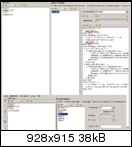Für das Rohrspiel habe ich meine 26 Charaktere einfach dupliziert und nur ID und Position und Links ausgestauscht. In jedem Wertebereich habe ich dieselbe Variable "Klick" definiert und auf einen Wert gesetzt. Hier bei
Rohr01 und
Rohr02.
Diese wird in den Aktionen abgefragt und offensichtlich funktioniert es. Das heißt, obwohl die Namen identisch sind, versteht Visionaire die 26 Klick-Variablenwerte als 26 verschiedene mit unabhängigen Werten?
Manchmal jedoch motzt Visionaire und akzeptiert keine doppelten Namen. Hängt das davon ab, an welcher Stelle die Variable deklariert wird? Nebeneinander, also auf derselben Hierarchie, geht nicht.
Alles, was UNTER einem bestimmten Level festgelegt wird, gilt nur für diesen Level und alle Unterlevel, aber nicht für den darüber? Also: wenn ich bei den
Kulissenwerten eine Variable einführe, ist die global für z.B. alle
Kulissenelemente? Oder wie läuft das genau ab?
Wenn ich nicht 26mal die Werte und Animationsnamen ändern müsste, die auf das Kulissenpbjekt oder die -Person beschränkt bleiben - es also egal wäre, ob ein Name doppelt vorkommt -, dann wäre ich echt glücklich. Ist nämlich eine MORDSarbeit.
Machtnix

